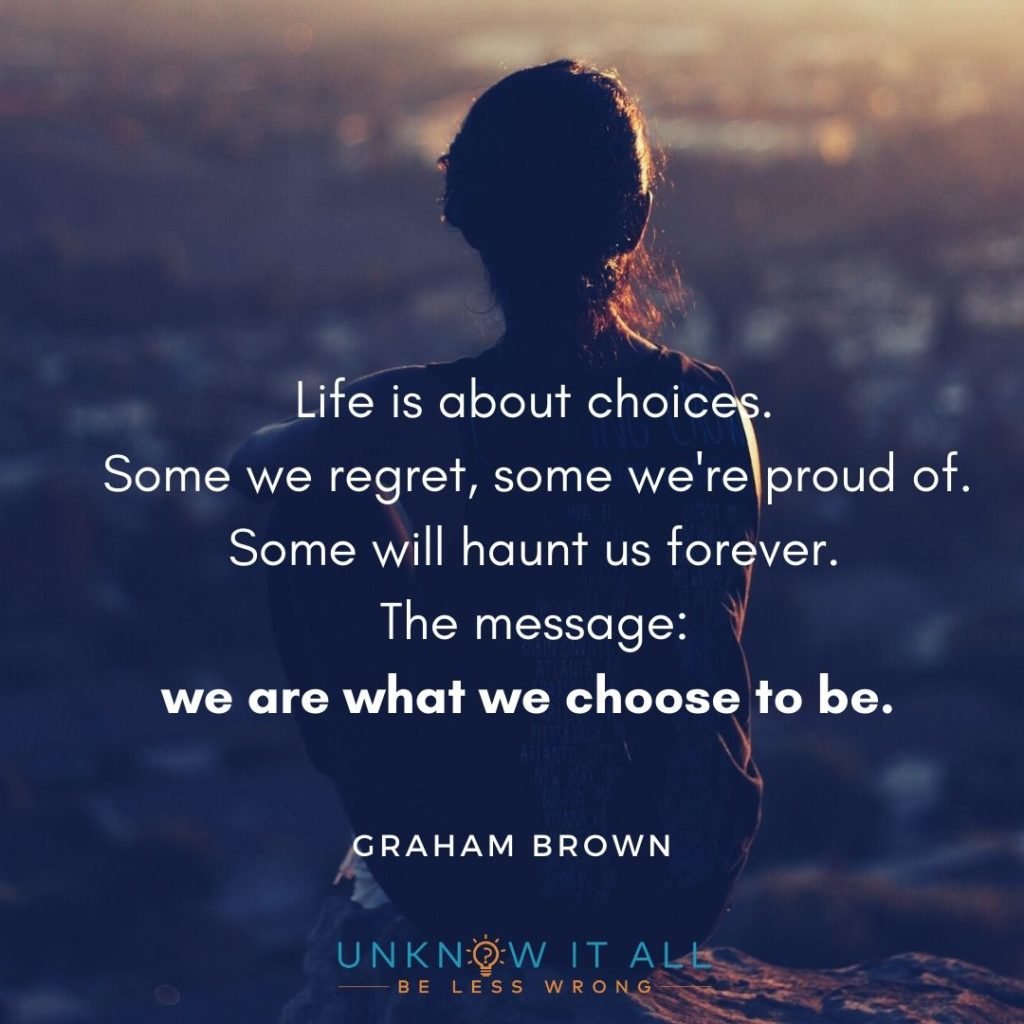There was once a time when the most difficult decision we had to make was picking out what colour crayon was best. Fun times, those.
Growing up means replacing crayon colour choices with ones about our careers, finances, relationships, and the type of people we want to be.
Yeah, things got hard pretty fast. There’s a pretty steep learning curve to life; most of us just pretend we know what we’re doing and make it up as we go along.
Is there any way to make things less confusing?
The next time you’re stuck deciding what to do, here are two general guidelines to keep in mind:
- The right thing to do is usually the difficult thing to do
- The difficult thing to do is always the thing you don’t want to do
Exceptions, of course, will always exist. But let’s see what’s behind these two rules:
Right = Difficult
In general, a hallmark of a choice being the right one is that it comes with an immediate cost to be paid. This cost could be monetary, but is more likely to be social, psychological or effort-based. This is what makes it the difficult choice.
For example, standing up to a bully is typically the right thing to do. But this comes at a potential cost – there could be a risk of physical injury*, a risk to our social reputation and a risk to our egos if we fail. This seems like too high a price for a lot of us, so we decide to do nothing.
In contrast, let’s look at the decision to not do anything about the bully. There is no immediate cost or risk to self, other than the guilt or shame we might feel for not acting.
It’s this precise combination to look for when we’re trying to figure out what the correct course of action is:
Right choice = Greater Immediate cost + Guilt/Shame for not picking this choice.
(*Note: I’m not condoning violence or putting yourself in harm’s way unnecessarily. Do the right thing – but be smart and safe about it.)
Difficult = Opposite of Natural Tendency
So now let’s look at what makes something difficult – i.e. why are some decisions more immediately costly than others? What is it about a choice that is likely to bring us at least some amount of social, psychological or effort-based pain?
It boils down to this: The more a course of action is the opposite of what we would naturally do, the more difficult or painful it becomes to do it. In the short term, making the difficult choice can even cause us unhappiness and stress.
Example 1:
- If you’re an extrovert, it may require a lot of conscious effort on your part to learn how to sit still and enjoy your own company. Few things could be more important though; a hallmark of a well-adjusted person is the ability to be happily alone with their thoughts.
- If you’re an introvert, initiating and leading conversations with others (especially strangers) may feel awkward at best or terrifying at worst. And yet, this is a vital skill to master both for professional and personal success.
Example 2:
- If you’re normally a care-taker that dotes on everyone else, the difficult thing to do would be to learn that you must also dote on yourself, and show yourself the same kind of care that you show others.
- On the other hand, people who are naturally self-interested (most of us) find it difficult to put other people first and be “giving”. Still, this metamorphosis becomes increasingly necessary as we mature; we never fully grow up unless someone else’s well-being becomes just as important to us as our own.
And so, here we’ve arrived at an uncomfortable truth of life: personal growth comes from doing the opposite of what is natural to us.
We all get stuck in one default way of perceiving and doing things. Wisdom, however, arises from learning the value of whatever it is to which we are opposed. We must unknow our tendency to stick with only what we already know. As we absorb new skills and perceptions, we enlarge our bag of tricks and grow out of the boxes that we’ve placed ourselves into. Only then can we become well-rounded people who can display exactly the right skill/judgement that the situation calls for.

Why we say we don’t make the difficult choice
Here are all the reasons people give themselves when they don’t want to do the difficult thing. Any of them sound familiar?
- “I can’t do this – it’s too hard. It’s not meant for people like me.” (For more on this – read about the fixed mindset and how to overcome it.)
- Why should I do it? Someone else will take care of it.
- I’ll just ignore it and everything will sort itself out.
- Pfft, this isn’t even worth the effort.
- I’ll do it later. (If this is you, check out this post on procrastination.)
- I’m just too lazy.
- I don’t know what to do. I’ll need to know more before I act.
Why we actually don’t make the difficult choice
You want to know the one central emotion underlying all those different excuses?
Fear.
The real reason why we choose not to do the difficult thing is not that we’re too lazy, or that it’s not our responsibility, or that we just trust things to sort themselves out. We do it because we’re scared of the things that could happen if we try – we’re scared at having to face and pay those immediate social and psychological costs. This fear expresses itself in different ways:
- Fear of Failure: “What if I try it and fail? I’ll look stupid.”
- Fear of Social Judgment or Rejection: “What will other people think about me if I do this? Will they see me as a loser?”
- Fear of Identity-Loss: A lot of us have invested much of our energy into believing we’re a certain kind of person:
- “I’m just a procrastinator.”
- “I love bread and will never be able to give it up.”
- “I’m a lazy person, and always will be.”
Even when we know that these identities that we’ve created for ourselves are not good for us, we cling on to them. We’ve devoted so much of ourselves into keeping these limiting self-beliefs alive that changing them can be downright terrifying.
What We’re Giving Up
Now, assuming that the right choice isn’t something that could kill us or cause us grievous bodily harm, what are we giving up when we refuse to do the difficult thing?
1.Self-Respect: The reputation that matters most in this world is the one we have of ourselves. Each time we fail to do the right thing, we teach ourselves that we are not people who behave with integrity. We learn that we are not to be trusted. And it’s hard to respect someone we can’t trust.
2. Real Happiness: If we can neither trust nor respect ourselves, then we can say goodbye to the possibility of being truly happy with who we are. Genuine and long-lasting happiness comes from self-love, and self-love comes from knowing we are good people who generally try to do the best we can with what we have been given.
3. Meaning and Purpose: When we’re younger, most of us are pretty self-focused. The more we grow up, the more this line of thinking gets old. Worrying only about ourselves seems immature and pointless. Why spend so much energy on ourselves when there are so many other worthwhile things that need our attention? Why not orient ourselves to doing the best we can and giving back by solving real problems?
And so we learn that we must serve a purpose greater than ourselves in order to find fulfilment and achieve some sense of meaning in life. Otherwise, we’ll always be haunted by the feeling that there’s more we should be doing. This typically means making the difficult choice on a regular basis, even when it is not self-serving.
The Way Forward..
We’re alive, so we might as well give life our best shot – it’s not like there’s anything better to do after all.
So get out there… and start doing those difficult things. Face that initial pain of leaving your comfort zone, and find yourself filling up with self-respect, happiness and meaning.


